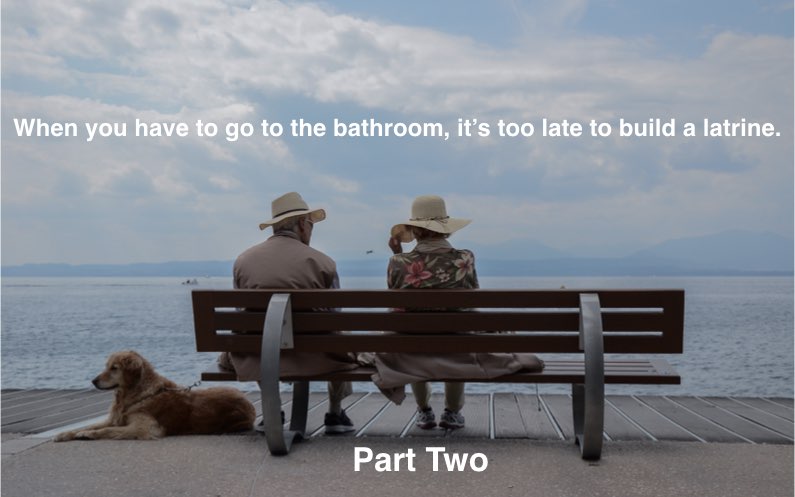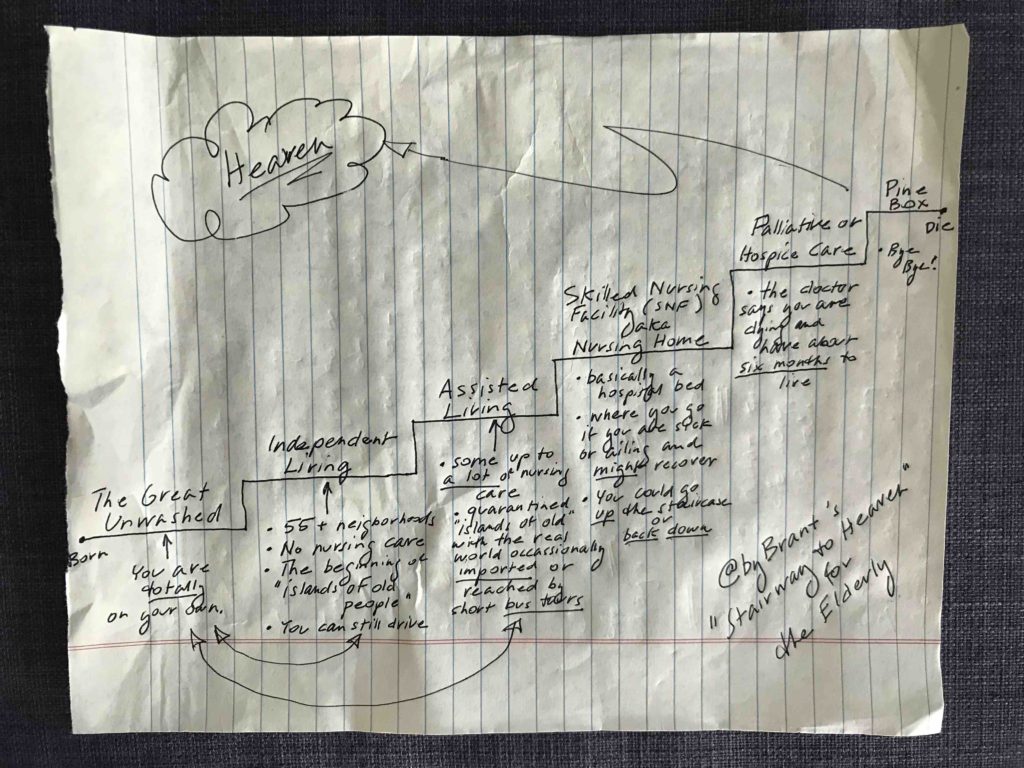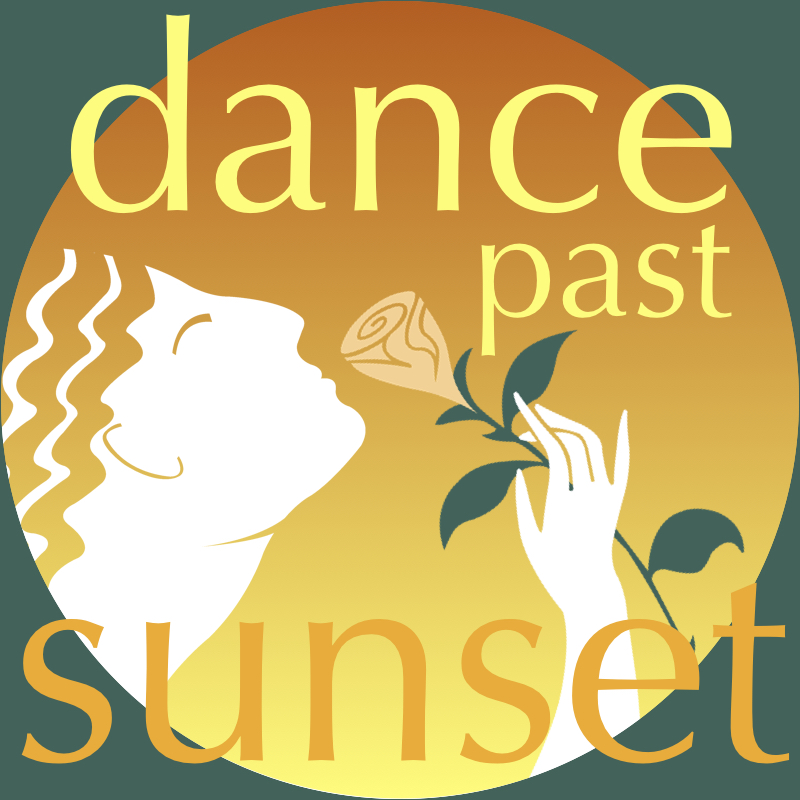Advanced Planning Step Two: Decoding Reality

Decoding Reality
First, let me decode some language for you. “Advanced Planning” and “Future Life Preferences” is code language for preparations we make (or not) for that final stretch of life we euphemistically refer to as our “sunset” years, hence the name of my podcast. This stretch terminates with death, which we again circumlocute (a long, complicated word meaning to “beat around the bush”) by rebranding death as end-of-life. Duh.
I find it helpful to think about my final stretch in the following three broad phases:
Phase One: Independent Young/Old
In this phase you are still energetic, relatively healthy, still willing to roll up your shirt sleeves and get a job done. You still want to travel, ski, enjoy vigorous sex, work out, and enjoy those peak life experiences. You may be 50 or you may be 80, but you are still a healthy and active person. You are probably retired, or ready to retire, and ready to shift gears into the second half of your life.
BUT…you may be experiencing some ageism in the workplace. You may be working hard caring for an older parent and starting to dip into your savings, wondering how long they’ll last. You may have had your first real health scare. You find yourself wanting to go to bed just a tad earlier. You feel the twinge of your age, but not the full frontal assault of it. Sure…you are getting old, but you still get your own bags down from the overhead bin!
Phase Two: Independent Old/Old
Things have changed. You are still mostly independent, but now you allow the stronger, younger guy to get those bags down for you, plus you accept all kinds of other help because you need it. Sure, inside you are still 30 years old, but your body isn’t, and you are experiencing all the vicissitudes of old age, starting with decreased strength and mobility. The term Wiki-leaks has a different meaning for you than most. Again, you may be 50 or 80 years of age, but in this phase, age still isn’t really about years — it’s about how well you care and have cared for your body and about how you think.
For example, you may find yourself thinking: “I don’t understand the world and all its complexities anymore. I don’t belong here.” I understand how that feels, but be careful with that kind of thinking, because it can lead to withdrawal from the world into what some call “islands of old age,” as characterized by most (but not all) 55+ retirement and assisted living places nowadays.
Is that what you want, or do you want to stay integrated with a diverse population? There is no right or wrong answer in general, but there is a right answer for you personally, so you’ll want to give it some thought.
Phase Three: Fully Dependent Old
Now you are fully dependent on others for pretty much everything needed to sustain your life — eating, toiletry, exercise, mental stimulation, social interaction. The notion that age is just a number is meaningless to you. You are truly old and pretty much can’t do shit by yourself. Your grandkids even need to help you change channels on your flatscreen (It used to be so easy!) Your body, which served you so well for so long, is now naturally failing. There is no Phase Four. The next milestone is death.
Some 75% of Americans want to age in their own homes (called “aging in place”) but only 25% do, and there’s a reason for that: In-home nursing care is damn expensive. Some of you may say to yourselves, “No worries. My kids will take care of me for free.” Okay, but did they sign up for that? Have you talked to them about it?
The time to have that conversation is before you get to this phase, and be sure you both know what you are getting into. Caregiving is very hard work, and not every child is cut out for it. Sometimes it’s better to let your kids be your kids, and let pros handle the care.
Brant’s Stairway to Heaven
If you are fortunate enough to live until a ripe old age, chances are at some point you will need assistance. There is a lot of confusion about the different types of professional care available to older folks. Nursing homes? Assisted Living? Independent living? Yikes! What does it all mean?
It would take more than this one blog post to answer that question, but I can give a quick primer in one simple picture, which I call my Stairway to Heaven. You’ll find it below. Use it to make some decisions about where you want to spend your sunset years (and money)

All professional care costs money, and lots of it, but surprisingly, it can cost less than aging-in-place (at home) with a professional nurse in attendance. That’s because at home, the nurse is likely dedicated 100% to you (or your loved one), and thus, you pay 100% of that resource. In a facility, the nursing costs (by far the most expensive element of care) are shared.
A useful tool for knowing how to pay for senior care is found at the aptly named Paying for Senior Care.
Beware the Medical Machine
As you plan, it’s important to understand that the medical system is like a machine with one gear: save the life at all costs. That is a doctor’s prime directive, enshrined in the Hippocratic oath they take as medical students. If you want them to do something different, such as allow for a natural death (as with a “do not revive” directive), then you must be aggressive, often with the help of an advocate, in order to force the medical machine to change direction. Even then they might not, and you could end up with an experience you don’t want.
I urge you not to let that happen.
But I’m not there yet!
The goal with these steps, as I stated in my introductory post “Why Concern Yourself with Advanced Planning?” is to make every day on the green side a good one, no matter what phase you are in, all the way to lift-off!
I certainly hope you are presently enjoying peak life experiences while you also make some time to think about what you want for yourself and your loved ones. Start by having some meaningful conversations with them. If you do that, you are way ahead of the game!
To stay in the game, take the next step.
Helpful Resources
"Caring for America's Most Vulnerable," an interview with John Maycroft, an expert on Advanced Planning. In this very short interview with John, recorded live at the 2017 Coalition for Advanced Care annual conference, you'll benefit from his perspective on the importance of Advanced Planning. John is the one who turned me on to The Conversation Project, a good (and free) resource for getting started.
"Let Go of Fear and Cut a New and Better Life Groove" with Jon Underwood, founder of the Death Cafe. Jon, who recently passed away, was a beautiful man with a beautiful idea: Have coffee and cake and just talk with a few friends. So simple, and yet, so powerful.
"How to Get Started with End of Life Planning," an interview with Rachel Zeldin, Founder of Funerals 360. Rachel provides insight into the workings of the funeral industry and helps you avoid some of the traps they set for grieving families.
"Let's Have Dinner and Talk About Death" with Michael Hebb, TedX speaker. Pop the cork on a bottle of wine with a few trusted friends, and have an honest, intimate conversation. Talk through your preferences...listen to how others think. Weigh the options. It's so important to know what your options are so you can make informed choices.
